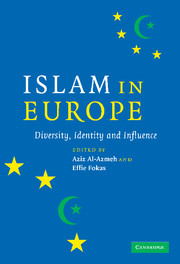Book contents
- Frontmatter
- Contents
- List of figures
- List of contributors
- List of abbreviations
- Preface
- 1 Introduction
- 2 Christians and Muslims: memory, amity and enmities
- 3 The question of Euro-Islam: restriction or opportunity?
- 4 Muslim identities in Europe: the snare of exceptionalism
- 5 From exile to diaspora: the development of transnational Islam in Europe
- 6 Bosnian Islam as ‘European Islam’: limits and shifts of a concept
- 7 Islam in the European Commission's system of regulation of religion
- 8 Development, discrimination and reverse discrimination: effects of EU integration and regional change on the Muslims of Southeast Europe
- 9 Breaching the infernal cycle? Turkey, the European Union and religion
- 10 Afterword
- Index
- References
8 - Development, discrimination and reverse discrimination: effects of EU integration and regional change on the Muslims of Southeast Europe
Published online by Cambridge University Press: 05 June 2012
- Frontmatter
- Contents
- List of figures
- List of contributors
- List of abbreviations
- Preface
- 1 Introduction
- 2 Christians and Muslims: memory, amity and enmities
- 3 The question of Euro-Islam: restriction or opportunity?
- 4 Muslim identities in Europe: the snare of exceptionalism
- 5 From exile to diaspora: the development of transnational Islam in Europe
- 6 Bosnian Islam as ‘European Islam’: limits and shifts of a concept
- 7 Islam in the European Commission's system of regulation of religion
- 8 Development, discrimination and reverse discrimination: effects of EU integration and regional change on the Muslims of Southeast Europe
- 9 Breaching the infernal cycle? Turkey, the European Union and religion
- 10 Afterword
- Index
- References
Summary
In the past fifteen years, European integration has been characterised by two seemingly contradictory but arguably interrelated phenomena of supranational market integration on the one hand, and growing minority mobilisation at the local and subnational level, on the other. The former is driven by economic imperatives to redefine the structures of national and regional political economy in order to enhance their production and administrative capacity, as well as their ability to compete in and converge with the European common market. A growing literature on the ‘new regionalism’ and regionalisation describes the emergence and construction of sub-state regions and institutional–administrative structures along such lines. Meanwhile, territorially concentrated minorities assert a strong sense of cultural distinctiveness, and advance demands for political self-determination, either in some form of self-government, autonomy or occasionally secession. Such politicisation is driven by a different logic that draws upon historically specific patterns of cultural affinity, collective solidarity and membership in a national or ethnic community. The upsurge of minority nationalisms in the 1980s and 1990s, in Catalonia, the Basque Country, Scotland and Wales, was arguably inseparably linked to EU integration and the processes of regionalisation. Together with the growing significance of sub-state regions in the EU, these were central factors driving the minority nationalisms. At the intersection of these two sets of processes – market integration and minority mobilisation – this chapter explores the regional changes occurring within the frame of European integration and enlargement.
- Type
- Chapter
- Information
- Islam in EuropeDiversity, Identity and Influence, pp. 149 - 182Publisher: Cambridge University PressPrint publication year: 2007
References
- 3
- Cited by



